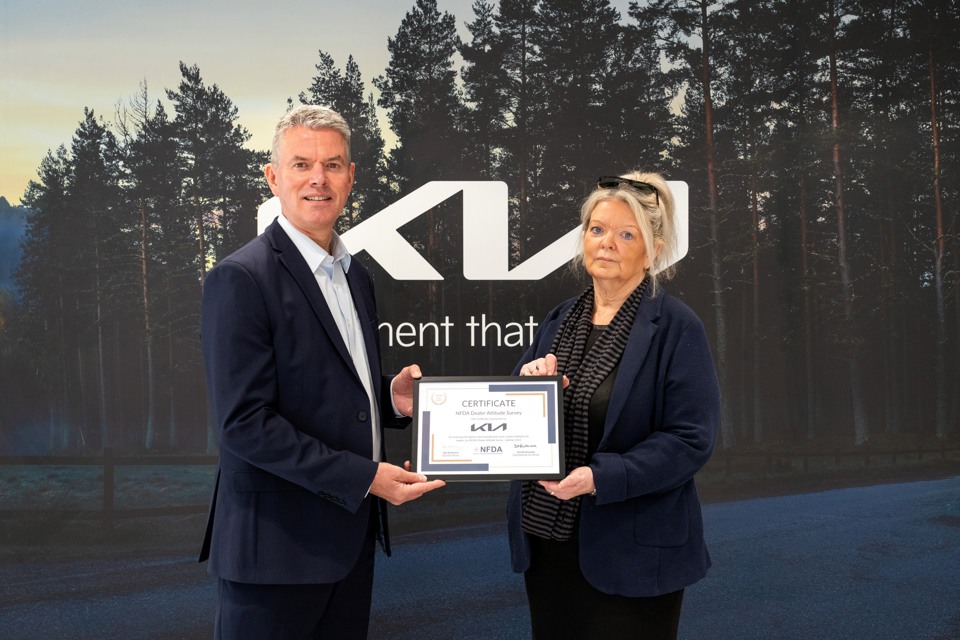Franchised dealers believe they are being saddled with too much of the cost of shifting to electric vehicles (EV) with scant support from the brands whose cars they sell, according to the latest industry analysis into dealer attitudes.
The survey was conducted by the National Franchised Dealers Association (NFDA) in September and asks franchised dealers questions about their relationship with their manufacturing supplier.
It revealed that sentiment around EVs is being weighed down by the high levels of investment required for the transition, in comparison to the lack of manufacturer support.
In particular, franchised dealers raised concerns over their manufacturer’s support for on-site EV charging infrastructure, returning an average of 4.9 out of 10, the lowest returning score for the entire survey.
Kia UK was declared the number one brand by dealers in the survey, achieving the highest overall manufacturer rating with 9.5 out of 10, and from a large response rate of 80 per cent of Kia dealerships.
Read AM's Brand Insight with Paul Philpott, president and CEO, Kia UK.
The result bucked the trend with Kia seeing an increase of 0.2 points over the previous survey, while other brands’ overall ratings decreased by an average of 3.1 per cent. Kia has now achieved a top three ranking in the last 15 successive NFDA surveys. Ranked number one across 20 of the 55 questions, one highlight included dealers noting their great satisfaction with Kia’s frequency of introduction of new models (9.5).
In particular, Kia was ranked top in four of six questions asked about electric and plug-in vehicles: including existing EVs on sale (9.3); proposed EV model range over the next two years (9.4); EV, PHEV and Hybrid training (9.3); and the return on investment on equipment and training for EVs and plug-in vehicles (8.5).
Kia’s ‘Plan S’ global business strategy will see 15 EVs launched by 2027, including nine for the UK market. Currently, Kia sells the fully electric EV6, Niro EV and Soul EV, with the flagship EV9 due to enter showrooms soon.
Speaking to AM about KIA’s electrification strategy, Paul Philpott, president and CEO, Kia UK said: “We're ahead of the curve now and that's where we intend to be as a leader in electrification. But it's not just about product. It's about the service that each dealer gives to customers.
“Customers want the confidence that they really understand what moving from a petrol car to electric vehicle will mean and the key point of contact is when they're face to face with a salesman in a showroom.”
“That salesman must be something of an evangelist for EVs, really enthusiastic, and even if the customer decides that now is not the right time for them to change from a petrol to an electric vehicle, when they next come back to in two or three years’ time and change their car again, they'll say “I remember you being really passionate about electric vehicles last time around, perhaps now's a good time to talk”.
In response to the general lack the support from manufacturers in terms of EV charging cited in the survey, Philpott said much is about supporting customer-facing staff with marketing materials and assets in the showroom.
“We've only just seen the final details of the government's zero emission vehicle mandate, despite it coming into force on January 1 next year, which sees us being required to move from where we are today - which is about 16 to 17% of EVs in the mix - to 80% by 2030.
“That's a pretty significant rate of climb and the fines if we don't get there are unsustainable so we have to get there through a mixture of having fantastic products, but also communicating effectively with customers and ensuring that showrooms across the country become the best place to buy an electrified car from Kia.”
“NFDA’s Dealer Attitude Survey is a comprehensive analysis that delves into the perspectives,” said Sue Robinson, chief executive of the NFDA which represents franchised car and commercial retailers across the UK.
“The DAS is an extremely valuable and constructive tool for both manufacturers and dealers. It enables many to better understand the areas that are damaging the relationships with their respective dealers.”
She added that she was particularly disappointed to see Stellantis brands again receiving the lowest scores across the board, saying it was “a clear indication of a challenged business relationship and highlights a pressing need for improved collaboration and support to better align with dealer expectations and foster a mutually beneficial business operation”.
















Login to comment
Comments
No comments have been made yet.